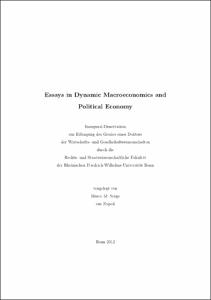Sorge, Marco M.: Essays in Dynamic Macroeconomics and Political Economy. - Bonn, 2012. - Dissertation, Rheinische Friedrich-Wilhelms-Universität Bonn.
Online-Ausgabe in bonndoc: https://nbn-resolving.org/urn:nbn:de:hbz:5-27480
Online-Ausgabe in bonndoc: https://nbn-resolving.org/urn:nbn:de:hbz:5-27480
@phdthesis{handle:20.500.11811/5246,
urn: https://nbn-resolving.org/urn:nbn:de:hbz:5-27480,
author = {{Marco M. Sorge}},
title = {Essays in Dynamic Macroeconomics and Political Economy},
school = {Rheinische Friedrich-Wilhelms-Universität Bonn},
year = 2012,
month = jan,
note = {This dissertation attempts in four essays to contribute to economic research in two separate fields, and is therefore divided into two self-contained parts.
Part I (Dynamic Macroeconomics) is rooted in the modern macroeconomic literature that aims at exploring theoretical departures from the classic rational expectations (RE) paradigm. According to the latter, economic agents know at all dates the full state of the economy as well as the structure which generated the state itself. Our study rather accounts for a time-varying structure and imperfect observability of the model's variables (chapter 1), and for advanced information on the future states - that is, for news shocks and anticipation (chapter 2).
In chapter 1, the problem of finding a solution to time-varying linear RE systems involving past expectations of the future state values and noisy observations is addressed. It is shown that there exists always an equilibrium path having the property of being the closest, in mean square, to the state motion of the autoregressive dynamic equation governing the perfect foresight behavior of the economic system.
Chapter 2 explores the empirical separability of news shocks and sunspots models. By means of the general martingale solution approach, we show that it may prove impossible to decide on an econometric basis whether the actually observed data is generated by determinate models driven by news shocks or rather by indeterminate ones forced by sunspot variables.
Part II of the dissertation (Political Economy) aims to contribute to the literature on the role of self-interested groups in the political arena.
In chapter 3, we investigate theoretically how the presence of (corruptible) judiciaries that oversee the political process impacts on one of the mechanisms by which lobby groups can influence policy outcomes, that is, bribery. We show that judicial independence is a necessary condition for deterrence effects to arise, as dependent judges are notable to prevent the interest group and the government from maximizing the profits from the deals between them. Judges must be subject to mechanisms that hold them accountable for their institutional role. Our analysis suggests that preserving the efficiency of independent judiciaries can serve as an instrument for self-enforced judicial accountability, even in the presence of corrupt societies.
In chapter 4, we study the process of legislative delegation in the presence of bureaucratic lobbying. We show that the possibility of strategic agency selection fully restores general results from the conventional theory of delegation. In particular, bureaucratic lobbying never reduces the scope of delegation across different political systems (parliamentary versus separation of powers), as it engenders no influence on the extent of (expected) policy bias induced by delegated legislation.},
url = {https://hdl.handle.net/20.500.11811/5246}
}
urn: https://nbn-resolving.org/urn:nbn:de:hbz:5-27480,
author = {{Marco M. Sorge}},
title = {Essays in Dynamic Macroeconomics and Political Economy},
school = {Rheinische Friedrich-Wilhelms-Universität Bonn},
year = 2012,
month = jan,
note = {This dissertation attempts in four essays to contribute to economic research in two separate fields, and is therefore divided into two self-contained parts.
Part I (Dynamic Macroeconomics) is rooted in the modern macroeconomic literature that aims at exploring theoretical departures from the classic rational expectations (RE) paradigm. According to the latter, economic agents know at all dates the full state of the economy as well as the structure which generated the state itself. Our study rather accounts for a time-varying structure and imperfect observability of the model's variables (chapter 1), and for advanced information on the future states - that is, for news shocks and anticipation (chapter 2).
In chapter 1, the problem of finding a solution to time-varying linear RE systems involving past expectations of the future state values and noisy observations is addressed. It is shown that there exists always an equilibrium path having the property of being the closest, in mean square, to the state motion of the autoregressive dynamic equation governing the perfect foresight behavior of the economic system.
Chapter 2 explores the empirical separability of news shocks and sunspots models. By means of the general martingale solution approach, we show that it may prove impossible to decide on an econometric basis whether the actually observed data is generated by determinate models driven by news shocks or rather by indeterminate ones forced by sunspot variables.
Part II of the dissertation (Political Economy) aims to contribute to the literature on the role of self-interested groups in the political arena.
In chapter 3, we investigate theoretically how the presence of (corruptible) judiciaries that oversee the political process impacts on one of the mechanisms by which lobby groups can influence policy outcomes, that is, bribery. We show that judicial independence is a necessary condition for deterrence effects to arise, as dependent judges are notable to prevent the interest group and the government from maximizing the profits from the deals between them. Judges must be subject to mechanisms that hold them accountable for their institutional role. Our analysis suggests that preserving the efficiency of independent judiciaries can serve as an instrument for self-enforced judicial accountability, even in the presence of corrupt societies.
In chapter 4, we study the process of legislative delegation in the presence of bureaucratic lobbying. We show that the possibility of strategic agency selection fully restores general results from the conventional theory of delegation. In particular, bureaucratic lobbying never reduces the scope of delegation across different political systems (parliamentary versus separation of powers), as it engenders no influence on the extent of (expected) policy bias induced by delegated legislation.},
url = {https://hdl.handle.net/20.500.11811/5246}
}






